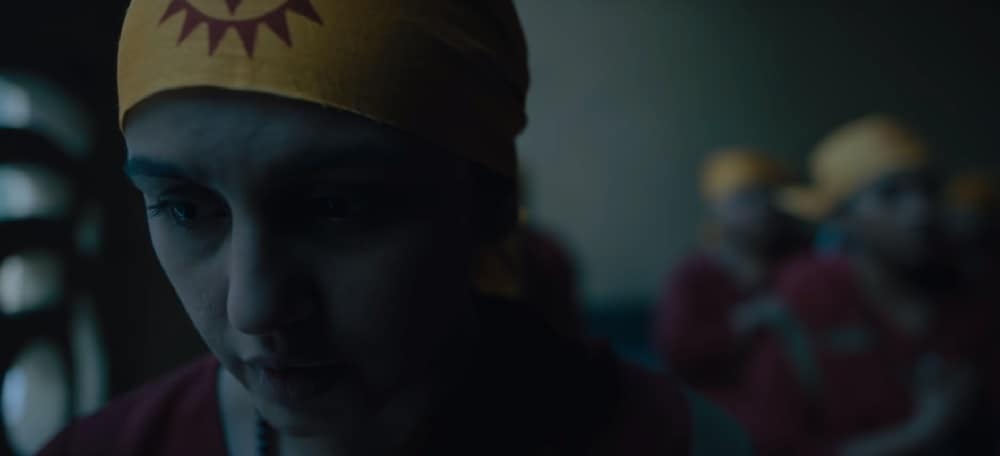The emergence of OTT platforms in the last few years has inspired a lot of content that one could not, by a far leap of one’s imagination, have hoped to see either on television or in theatres. Creating real impact though only comes from breaking new ground, and we are beginning to see that with shows like Netflix’s newest Indian offering – _Leila_ . [caption id=“attachment_6222011” align=“alignnone” width=“1000”]  Huma Qureshi in a still from Leila[/caption] The show is based on Prayaag Akbar’s 2017 book of the same name, and paints the picture of a technologically advanced society, but with an obsession for purity. The story is based in a fictional country, Aryavarta (referred to in ancient Indian lore as the place where Indo-Aryans lived) and tells the story of a woman who, once wealthy, gets marginalised and pushed by the state into a life of degradation because she does not fit the norms of ‘how women should be.’ This is not the first time we are seeing a piece of dystopian fiction coming from our shores though. Last year, Netflix released Ghoul, a miniseries that was also set in a dystopian future. And while that one touched upon religious fundamentalism, it veered off into a more comfortable ‘horror’ zone without really exploring its dystopian tropes enough. It started something, though: a genre that has hitherto been absent in our filmmaking. So why now? [caption id=“attachment_5097401” align=“alignnone” width=“825”]  Radhika Apte in a still from Ghoul[/caption] They say art is a reflection of the times we live in, and none more so than the art of storytelling. Over centuries now, governments, politicians, clerics, thinkers and businessmen have peddled their idea of utopia to the masses —an imagined future paradise, one without war, famine or crime. It is the stuff that dreams are made of — why would not you want to believe that supremely happy narrative? Simple. Because it is not real. Human beings are inherently flawed, and the world we live in is flawed. It is in this context that writers have always found dystopian themes, by magnifying exactly what could go horribly wrong with all that seems to be a promise of paradise. Gulliver’s Travels, arguably the first ever dystopian tale to be told, had the protagonist discovering ‘perfect’ societies, only to discover that the perfection existed for just a few while masses suffered to make that dream possible. Sounds familiar yet? It’s a recurring theme in stories like Animal Farm, The Time Machine and Brave New World. The last 40 years though have seen a more targeted attack on war, technology, race, gender and religion, issues that post-millennial generations seem to be dealing with a lot more than their predecessors. The attacks on war and technology have taken different forms. There are post-apocalyptic tales such as The Hunger Games, The Maze Runner, the Divergent trilogy and The Man in the High Castle, all of which paint a picture of a bleak world that got destroyed through war. And there are cautionary tales like the ones you see in Black Mirror. What is common to all these pieces of fiction is that they seem far fetched enough to fill up shelves in the fantasy sections of bookstores, or make for good wholesome family entertainment over dinner. Nobody really minds. [caption id=“attachment_6821101” align=“alignnone” width=“825”]  A still from Black Mirror season 5[/caption] It is the stories on race, gender politics and religion that really make people uncomfortable. Because they inevitably hit so close to home. The most politicised piece of fiction in recent times has been Margaret Atwood’s 1985 novel The Handmaid’s Tale. When the timeless classic got made into a show by Hulu two years ago, it brought to the fore a lot of what Americans think is wrong with the US today. The show depicts the country regressing into a totalitarian state (renamed Gilead), with a highly religious society. In a world where fertility rates have plummeted, women who are fertile get captured and taken in as handmaids to breed for their ‘owners,’ while those who cannot are assigned other blue-collar jobs. Women are not allowed to read, and the punishment for breaking this ordinance is a finger chopped off (used to be a hand but they relaxed it out of the goodness of their hearts). Dissenters are publicly executed and all of this is done in the name of ‘the good book.’ Yes, it is an exaggerated worldview on the resurgence of the politics of gender and religion, but it makes you think, doesn’t it? [caption id=“attachment_4303221” align=“alignnone” width=“1200”]  Elisabeth Moss in a still from The Handmaid’s Tale[/caption] And so does Leila. In the context of India, the themes become those of caste and religion, leitmotifs that have always existed but are suddenly in your face a lot more. The show is set in the near future, and how near that future is, is really just a function of how you interpret what is going on in the country around you. It is a classical dystopian construct — religious fundamentalists have taken over; there is constant state surveillance; a climate crisis and water shortages; the class divide has taken on abyss-like proportions; and women are degraded and forced into labour, all for a higher purpose and to prove their purity and devotion to the state. It is a story of a woman looking for her lost daughter, but make no mistake — this is more a treatise on class, majoritarian privilege and the choices that we have in front of us today. If it sounds a lot like The Handmaid’s Tale, it is because the issues are the same, despite the milieu being different. These shows do not make for easy viewing. The Handmaid’s Tale made a lot of Americans uncomfortable. If Leila makes you uncomfortable, it is because it should. It would seem India is finally ready to tell its own cautionary tales.
Netflix’s dystopian drama Leila is the most recent example of content that one could not have hoped to see either on television or in theatres.
Advertisement
End of Article


)
)
)
)
)
)
)
)
)



